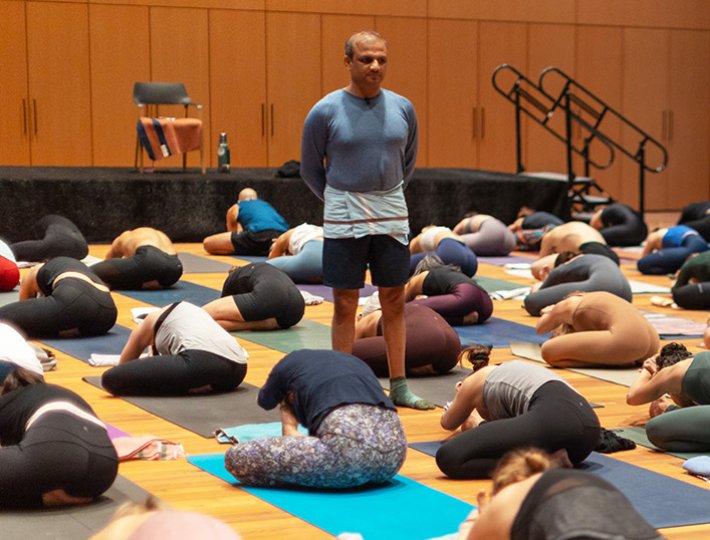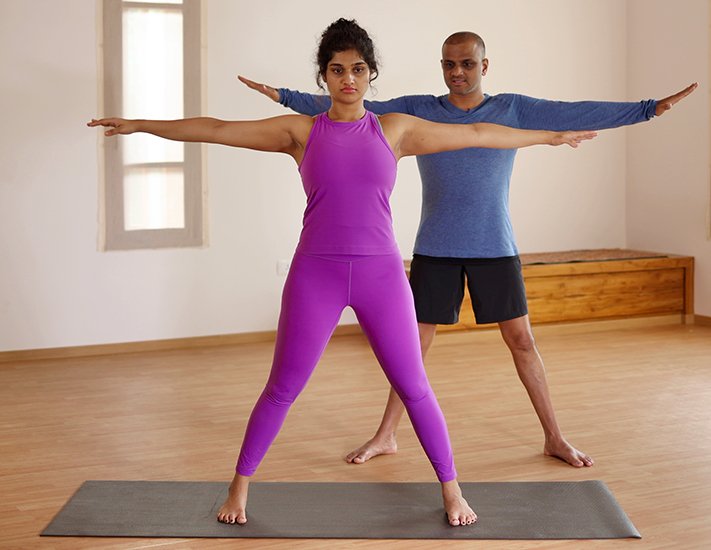People sometimes ask me about the benefits of meditation practice. My go-to answer is a balancing act of the scientifically proven results—you sleep better, develop resilience to stress, improve productivity, to name a few—and my personal experience that my practice has allowed me to show up more fully and authentically for the rest of my life. It has also helped me get really good at holding space for people when they are deeply suffering. When you’re in my line of work, you are surrounded, primarily, by people who are deeply suffering.
The act of meditation is, essentially, a process of getting to know and holding space for all of who we are. Despite what you may see played out in the movies, meditation is not you sitting blissed out as the wind perfectly billows your hair. In reality, it is sitting there while you keep re-playing that awkward conversation you had two days ago. At some point in your practice, you may notice that you’re nowhere near present with the breath, and then get annoyed at yourself and start fresh, only to be “present” for 10 to 30 seconds before your mind drifts off again.
And yet, the more we do this important work, the more we realize that we can hang out with ourselves and not get too frustrated after all. We can become familiar with and, ultimately, embrace all of who we are: the brilliant and creative sides of ourselves as well as the negative, self-doubting parts. While meditation doesn’t always feel “good,” it does allow us a chance to hold our seat and befriend ourselves, which is always good.
When we hang out with others, we carry over our ability to be present. That could mean that when we go out on a date, we’re actually there with our date, listening to them and enjoying the time we have with them, as opposed to mentally still clocked in at work. When we get to the gym, we actually show up for that interaction in a way that feels meaningful to us. And when we are confronted with someone who is going through a really hard time, we offer our non-judgmental presence and open heart to the best of our ability, holding space for them to be what they need to be.
When I was working on my last book, Love Hurts, my meditation practice was put to the test. As part of my research, I would meet with people each morning for 20-minute sessions, and hold space for them while they talked about their experience with heartbreak. I would, literally, ask them the question, “What is your experience of heartbreak?” and shut up until they were done responding. Sometimes, they used the full 20 minutes. And while I heard many stories about break-ups and divorces, I also heard accounts about addiction, death, adoption, illness, aging and more.
After holding space for these individuals and listening (I mean, really listening) to them, I always asked the same follow-up question: “How are you feeling right now?”
The funny thing is, more often than not, even though I had not commented on their experiences at all, they would say, “You know, I actually feel a bit lighter” or “I feel less overwhelmed by my emotions, having said all of that.” Simply by holding space for these complete strangers, something was able to shift and change within them. They were able to feel seen, heard, and have their burden lightened.
This experience gave birth to a theory: Sitting with yourself in meditation is excellent training for sitting with other people, in particular, those who are having a hard time. Just like you are holding space for yourself to freak out, experience peace, and everything in between while on the cushion, you are more able to sit mountain-like and be there for people who are doing the same off the cushion.
I admit, I’m the type of person who likes to fix everything. If a loved one is grieving, I would love nothing more than to say the perfect thing and have them perk up and say, “I never thought about that before,” and then be cheerful from that day on. But that’s not how grieving works.
Think back to the last time you felt deeply shaken by grief. Do you remember the long soliloquies your friends and family delivered? That long text message or email? Or do you remember someone sitting there with you and holding your hand, offering silence while you cried into a beer? I don’t know about you, but the latter are the most potent moments of support that I have experience when I’m grieving – that person who offers their undivided presence and support.
RELATED: A Meditation for Grief
These days, I still get emails from people who read Love Hurts, expressing that they don’t think they will love again, or that they are too damaged to heal from whatever they have gone through. Sometimes, they may even include their phone numbers and ask that I call. Although I don’t know them or the specifics of their situation, I always call. I tell them that they will love again, and that even the most heartbreaking, devastating emotions we feel are subject to impermanence; they will change, shift and they will, eventually, heal. I really do believe that. It’s all I say, and then I hold space. While it’s true that I’m a stranger, sometimes on the other side of the world, that’s all these grieving people want from me. Space. Support. Love. The more we practice offering these things to ourselves in meditation, the more we will be able to offer them to those in need.








Comments (0)